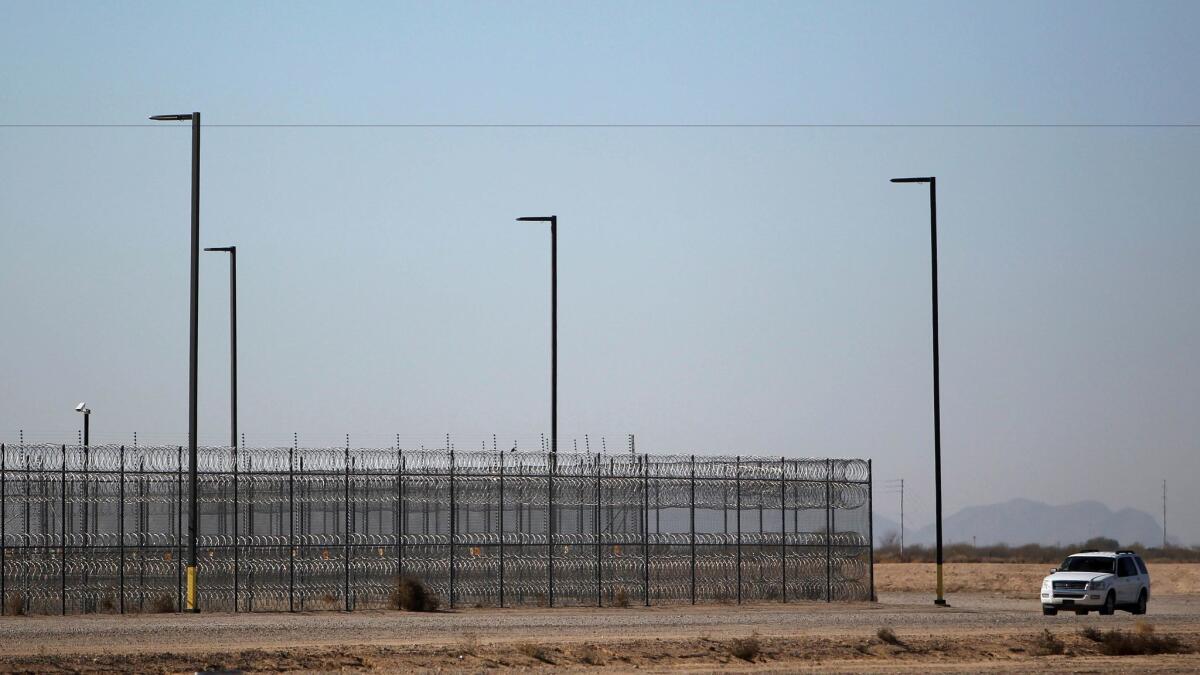Editorial: The Supreme Court can end some draconian immigrant detention rules

Alejandro Rodriguez was an infant when his parents brought him to the United States. He grew up in Los Angeles as a lawful permanent resident, and when he came of age, he had permission to work — which he did, as a dental assistant, to support his two young children. But Rodriguez also ran into some legal problems. When he was 19 he was convicted of joyriding, and in 2003, when he was 24, Rodriguez was sentenced to five years’ probation for misdemeanor drug possession.
After the second conviction, federal immigration officials detained Rodriguez and began deportation proceedings to send him back to Mexico, the country he had left as a baby two decades earlier. Rodriguez’s legal battle dragged on and on, and he remained incarcerated. Finally, three years after he was locked up, he and the ACLU filed a lawsuit challenging the federal government, saying it had no right to hold people for more than six months without a hearing before an immigration judge to determine whether their detention remained justified. The Supreme Court will hear oral arguments in the case Wednesday.
Immigration law is notoriously arcane, but this issue is pretty easy to unravel: The government should not hold people accused but not convicted of crimes — or in this case of violations of civil immigration law — for extended periods of time without giving them an opportunity to ask a judge to release them on bond or otherwise. It’s an issue of basic fairness and justice that lower courts in four federal circuits have recognized. Yet the Obama administration continues to fight these appeals, which it lost in the Rodriguez case before the 9th Circuit Court of Appeals in San Francisco. It lost a similar case before the 2nd Circuit Court of Appeals in New York City, which held that people detained for more than six months must be given a bond hearing.
The government argues that a 1996 law requires it to detain immigrants with past convictions for felonies or drug offenses who are facing deportation. But law or no law, officials cannot ignore the due process protections guaranteed under the Constitution. That means they cannot deprive people of their freedom without giving them a chance to ask a judge to free them in exchange for an incentive or an enforcement mechanism, such as a bond or an electronic ankle bracelet, to return for later proceedings.
Some argue that such a policy will endanger public safety, but that misreads both what the court is being asked to do and the nature of the folks in detention. Despite the heated rhetoric of the Trump campaign, people living in the United States without permission are not inherently violent criminals. And the court is not being asked to free all those in detention but merely to allow them periodic hearings before immigration judges who, based on recommendations by government lawyers and petitions by the detainees, can determine whether a detainee’s continued incarceration is in the public interest. More broadly, the government does not have a right to incarcerate people indefinitely — citizens or not — without judicial overview. That is a fundamental element of our legal system, and a necessary check by the courts on abuse of power by the executive branch.
The Rodriguez case is being brought on behalf of all similarly situated immigration detainees, and the Supreme Court’s decision could force a fundamental change. It should.
Rodriguez was released after he filed his lawsuit; the government then tried to have the case tossed out because, it argued, with Rodriguez granted his freedom, the legal argument was moot. The courts didn’t buy that, obviously, and the case continued even as Rodriguez was given permission to remain and work in the U.S. — just the kind of leeway we want immigration judges to have when they see that the circumstances of a particular case call for more flexibility than a black-and-white doctrine.
Follow the Opinion section on Twitter @latimesopinion and Facebook
More to Read
A cure for the common opinion
Get thought-provoking perspectives with our weekly newsletter.
You may occasionally receive promotional content from the Los Angeles Times.










